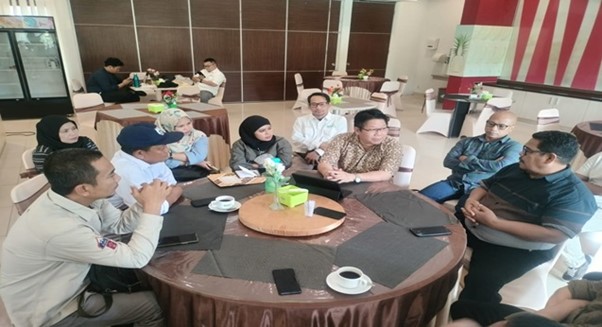PT Great Giant Livestock (PT GGL) Terbanggi Besar, Central Lampung, received a working visit from the West Sulawesi Provincial Government in order to conduct field studies regarding the potential for developing the agricultural and livestock sectors to strengthen synergies between the government and the private sector. West Sulawesi Province Assistant for Economy and Development, Muhtar, and his staff were welcomed at the Great Giant Foods Training Center on Friday (9/8).
Ferdy Fu, as FA Protein & Plant Based SubDiv Head, in his discussion explained that the existence of cattle farming in the company is part of the circular economy concept, where solid waste from pineapple skins is used as animal feed. He also revealed that managing a cattle farming business has its own challenges, especially in terms of capital. Ferdy explained that with the price of a cow ranging from IDR 15 million to IDR 18 million, profits can only be made after several months, while maintenance costs continue.
Ferdy added that livestock management can be done through a partnership pattern, although this is not easy. The main challenge is how to ensure the availability of sufficient feed throughout the year. He gave the example of conditions in West Nusa Tenggara, where there are 4 islands that can be selected for development. According to Ferdy, the availability of feed throughout the year is very important, but to achieve this requires large investments, such as in the procurement of sealer baggers which are quite expensive. Therefore, investment readiness and understanding the consequences need to be considered carefully. “Things like this must be mapped out first by stakeholders who will develop livestock, in addition to considering capital, infrastructure and feed availability,” said Ferdy.
He also mentioned that East Nusa Tenggara has Sumbawa cattle which are left to graze in the fields, but land control is an issue that needs to be considered. Ferdy cannot confirm what model is suitable for West Sulawesi, whether intensive with structured pens or extensive with the integration of oil palm plantations and cattle. “Going back to the issue of capital, then we will talk about empowering farmer-breeder communities through partnerships. What is the business model, what is the role of government and the private sector, and the position of farmers and breeders in this partnership. “All of this needs to be mapped out first because it concerns business strategy,” explained Ferdy when answering questions from guests regarding cattle partnership patterns.

